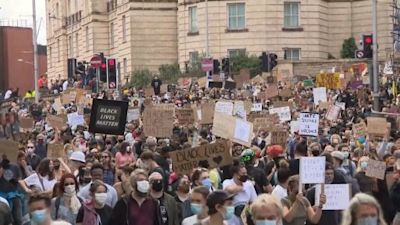Bristol council calls for parliamentary inquiry into slavery reparations

Bristol City Council will call for a parliamentary inquiry to investigate reparations for the UK’s part in the slave trade, making it the first local authority outside London to make such a call.
It is also set to support a Bristol “reparations plan” led by local Afrikan heritage community organisations and to implement “community wealth creation” strategies in the city.
The moves, set out in a motion from the Green and Labour groups, were supported by a majority of elected members at an extraordinary full council meeting on Tuesday 2 March.
The historic vote came nine months after a statue of slave trader Edward Colston was toppled and dumped into Bristol harbour.
Former Lord Mayor and Green councillor for Cotham, Cleo Lake, whose previous attempts to bring a similar motion before full council were unsuccessful, told members: “What a difference a year makes.”
Cllr Lake was clear that “reparations does include but goes beyond monetary compensation”.
“It is of international significance that this cross-party motion has passed,” she said after the meeting.
“Today, the council has voted to start a national conversation and re-examine our past.”
Mayor Marvin Rees said that conversation would be complicated, but needed to happen.
He told the meeting that “racism is real and white privilege is real".
He said the national conversation must acknowledge that race is an “ever present factor” determining life chances and life expectancy, and encompass class and social immobility as well.
Reparation is an opportunity for forgiveness and reconciliation, he said.
Deputy mayor Asher Craig said the “atrocities” against enslaved Africans had “far reaching” effects on their descendants today.
Liberal Democrat councillor Sultan Khan said the slave trade was “one of humanity’s greatest crimes”.
Green group leader Eleanor Combley said the harm done was on an “unimaginably large scale” and reparations was a process for repairing that harm.
But Conservative councillor Steve Smith said the motion on reparations was potentially divisive and the Tories were “unable” to support it.
“We respect every person for who they are and what they can do, not what group they belong to,” he said.
“Picking out particular groups of people for special treatment is alien to that way of thinking.”
It would be “irresponsible” to support a reparations plan and community wealth strategies without knowing what they are, he added.
Jendayi Serwah from the Afrikan ConneXions Consortium said: “This is a matter that matters to many of us and we’ve been campaigning for years.”
She cited 72 people who wrote in support of the motion, 200 who backed Cllr Lake’s previous motion, as well as more than 16,000 people who signed the “Stop The Maangamizi: We Charge Genocide” petition calling for an all-party parliamentary commission of inquiry into reparations.
Forty-seven councillors from the Labour, Green and Liberal Democrat groups supported the cross-party motion and 12 Tory councillors opposed it.
Credit: Amanda Cameron / LDRS
Read more: